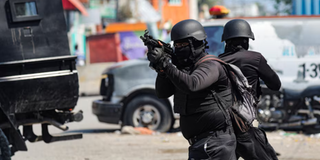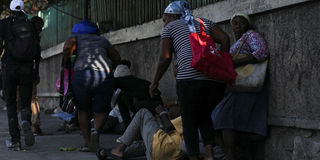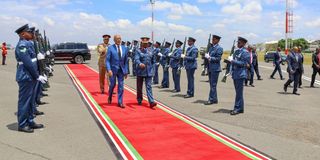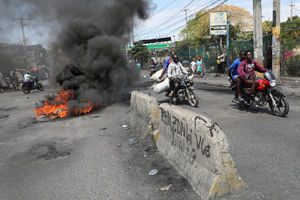
Police officers take part in an operation on the surroundings of the National Penitentiary following a fire, as a powerful gang leader in Haiti has issued a threatening message aimed at political leaders who would take part in a still-unformed transition council for the country, in Port-au-Prince, Haiti, March 14, 2024.
For the US, the push for stability in Haiti is a selfish one – to get Haitians remain at home and not add to the ballooning border crossings by migrants.
Since mid-2022, more than 357,000 asylum-seekers from Cuba, Haiti, Nicaragua and Venezuela are reported to have legally entered the US – the majority being Haitians at 138,000 – in a programme that allows in 30,000 people from these countries every month.
Some 21 Republican-led states mounted – and lost – a challenge in court against the programme last week. But it is the illegal immigration that is more worrying, especially in an election year.
It was not until September 19, 2023 that Kenya caught the international attention when US President Joe Biden praised his colleague William Ruto for his willingness to deploy 1,000 police officers to help restore order in the gang-ridden nation.
During the official opening of the 78th Session of the General Debate at the United Nations Headquarters in New York, Mr Biden said the move by Kenya would go a long way in helping restore peace and alleviate the suffering of Haitians.
“The people of Haiti cannot wait any longer,” Biden said of the mission that later received UN backing.

People flee as police officers clash with gangs during a protest against Prime Minister Ariel Henry's government and insecurity, in Port-au-Prince, Haiti March 1, 2024.
With the deployment of the officers to Haiti in limbo, owing to the resignation of PM Henry Ariel, the US has geared up its efforts to ensure the mission is a success by setting aside an additional $100 million to the $200 million it had pledged.
For Mr Kevin Osido, a Kenyan public policy and governance expert, the decision by the US not to deploy its army or police to Haiti is strange.
“There is something the Kenyan and US governments are not telling us. Details on the agreement that cleared the way for this deployment have not been made public,” he said.
Having boots on the ground has, however, remained unpopular for Americans with the Iraqi and Afghan debacles cited as examples.
Two phone calls in under a week have been exchanged between President Ruto and US Secretary of State Antony Blinken. The calls are to ensure the mission remains on course.
The second call came hours after Mr Ariel’s resignation. Mr Blinken reportedly briefed Dr Ruto on the decision of the Summit of Caribbean Countries and the US on the political situation in Haiti.
“He informed me that a new Presidential Council will be formed shortly to manage the situation in Haiti,” President Ruto said.
“I assured Secretary Blinken that Kenya will take leadership of the UN mission as soon as the Presidential Council is in place under an agreed process.”
On March 12, a senior State Department official said $200 million would come from the Department of Defence and $100 million from the State Department. A day before this, Mr Blinken had announced an additional $33 million “to help the Haiti people during this difficult time”.
US officials have been in constant communication with Kenya since the suggestion to lead the Haiti mission was made by the then-Foreign and Diaspora Affairs Cabinet Secretary Alfred Mutua (now Tourism CS) in July last year. It sounded like a bad joke at the time.
Months later, the process was challenged in Kenyan courts. The administration subsequently manoeuvred and signed a deal with Mr Henry.
While signing this document in Nairobi, chaos erupted in Haiti. Powerful gang leader Jimmy Chérizier “Barbecue” brought together armed groups and escalated the violence by taking control of most of capital, Port-au-Prince.
A key demand by the gangs was the resignation of Mr Henry, which happened eventually.
Henry’s stepping down threw into disarray Kenya’s “sealed” deal for having police officers deployed to Haiti, a delay confirmed by Foreign Principal Secretary Korir Sing’oei.
President Ruto then assured Mr Blinken in a phone call that Kenya was still committed to the mission.
Canadian Prime Minister Justin Trudeau and his Bahamian colleagues Philip Davis have also been in touch with Dr Ruto.
“During the discussions, I conveyed our unwavering commitment to supporting Haiti, emphasising that Haitians are our brothers and sisters. I assured them that we will remain involved and we will not abandon Haiti in her time of need,” President Ruto said, indicating that a reconnaissance mission would be deployed to the Caribbean country “as soon as a viable administration is in place”.

Former police officer Jimmy "Barbecue" Cherizier, and leader of an alliance of armed groups, speaks to a news outlet on a mobile phone during a news conference, in Port-au-Prince, Haiti, March 11, 2024.
To understand why the US is keen on this mission, it is important to go back to history.
In the early 20th Century, President Woodrow Wilson sent US marines to Haiti to restore order and maintain political and economic stability after the assassination of the country’s president in July of 1915. The US mission lasted until 1934.
But even before the occupation, files in the US government archives reveal that Washington had interests in Haiti, seeing it as a potential naval base.
“Haiti’s stability was of great interest to US diplomatic and defence officials who feared instability might result in foreign rule of Haiti,” the archive documents state.
The occupation was, however, not welcome by Haitians and they resisted it.
In his article The US Power Elite and the Political Economy Occupation: Investment, Race and World Order published by the Journal on Haitian Studies in 2015, Jeffrey W Sommers – a scholar – argues that the occupation violated the rights of Haitians.
“The US had a hemispheric hegemonic agenda that drove it to promote an investment agenda targeted in Haiti. It justified its violation of Haiti’s sovereignty through longstanding, deeply entrenched racial stereotypes and civilisation taxonomies,” he states.
In 1868, President Andrew Johnson called for the annexation of the island of Hispaniola, made up of Haiti and the Dominican Republic, “to secure a US defensive and economic stake in the West Indies”.
The plan, as well as efforts by Secretary of State James Blaine, from 1889 to 1891, to seek a lease of Mole-Saint Nicolas, a city on Haiti’s northern coast strategically located for a naval base, did not work.

Haitian Prime Minister Ariel Henry lands in Nairobi to push for Kenyan police deployment.
The US, in 1910 again, through President William Howard Taft granted Haiti money in hopes that Haiti would pay off its international debts and lessen foreign influence but this strategy failed as the debt was too huge and internal instability in the country persisted.
Earlier on, France – Haiti’s former coloniser – had forced Haiti to pay large amounts for years as “compensation” for chasing away French slave owners, giving the European nation influence over Haiti’s trade and finances.
This did not please the US, which was wary of other growing foreign influences in Haiti through direct investments in trade and intermarriage, to circumnavigate Haiti’s laws banning foreign land ownership.
“The US...feared German control of Haiti would give them a powerful advantage in the area,” US government archive documents state.
Between 1911 and 1915, seven Haitian presidents had been assassinated or overthrown. In 1914, President Wilson sent in US marines who took $500,000 from the Haitian National Bank “for safekeeping”.
The assassination of Haitian President Jean Guillame Sam in 1915 led to the occupation of the country by the US on the pretext of promoting peace.
The real intention, however, was that the US was protecting its assets in and preventing a possible German invasion.
Another election was conducted in 1915 under the tutelage of the US which pushed for a new constitution that allowed foreign landownership.
This change was rejected by the legislature that instead started drafting an anti-US constitution. The US influenced the dissolution of the parliament. The legislature never met until 1929.
In subsequent years, the US worked with “friendly” Haitians to influence and shape the country’s politics.
This reorganisation saw Haiti become fairly stable and a select group achieved economic prosperity, with majority investments being injected into the country by the US through aid, grants and concessions but most Haitians remained in poverty.
The aid did not improve the situation for individual Haitians.
US occupation in Haiti ended after President Franklin D Roosevelt signed the Good Neighbour Policy in December 1933 and officially withdrew in 1934 while retaining economic connections, which they still hold.
Fast forward to 2021. Haitian President Jovenel Moïse was assassinated and a request made to the US to assist the country via military intervention by one of the battling factions of the torn nation.
While not sending marines to Haiti, the US instead turned to the UN and its other member states and pledged to offer financial assistance to fund the mission. This sucked in Kenya.












